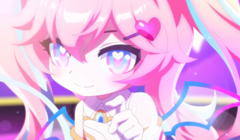It was a normal night for Darim, a dedicated animator, who had just unveiled a new character for the popular video game MapleStory in South Korea. Filled with pride, she shared the trailer on social media, only to be met with a torrent of harassment. A single frame from the video drew ire from young male gamers, who mistakenly believed a hand gesture made by the character mirrored something used by a radical feminist group years ago, aimed to ridicule men’s anatomy. In a matter of hours, Darim became inundated with death and rape threats.
The backlash was swift and brutal. Critics hurled vile insults at her, and demands for her dismissal escalated. The promotional video was quickly withdrawn, and her studio faced immense pressure after falsely being branded as a feminist organization. The flood of negativity was overwhelming, prompting Minsung Kim, a 22-year-old gamer who experienced similar sentiments once, to rush in and help organize support for victims of online harassment like Darim. "We urged her studio to stand their ground," he remarked, as they offered to assist with legal action against the abuse.
This incident highlights a larger trend in South Korea, where a vocal contingent, largely composed of young male gamers, conducts hostile campaigns against women they regard as 'feminists', even if the accusations are groundless. As Darim's case underscores, the rise of these online witch hunts has fostered an environment of fear among women in gaming and beyond. Many have started to hide their feminist views, fearing repercussions in their careers.
These extreme reactions are reflective of a growing backlash against feminism in South Korea since the mid-2010s, which witnessed an uptick in women's rights activism amidst rising gender discrimination. Men's perceived threat to their positions spurred hostility, with some attributing declines in employment opportunities to women, exacerbated by rhetoric from prominent figures, including politicians who downplay or even deny the existence of gender inequalities.
The consequences of this erosion of women's safety have become stark. Darim's studio, feeling the pressures from the witch hunts, dumbed down their characters, avoiding any hand gestures that could be misconstrued as feminist. Such actions have become a common strategy in various industries to mitigate any backlash. A significant number of women avoid even the personal expression of being a feminist, fearing their careers may crumble under the weight of public scrutiny.
As the cycle of witch hunts perpetuates, it’s evident that these men harbor considerable influence over major corporations, which act preemptively to quell potential disputes. In the backdrop of this painful climate, women appalled by the unfolding situation have begun to mobilize, seeking to challenge both the social norms and institutional policies that have permitted such harassment. However, any attempts to institute legal safeguards against discrimination still face significant obstacles.
The caution many women exercise around their identification with feminism due to fear of reprisal has profound implications for gender advocacy in South Korea. A recent IPSOS poll revealed a drop in women identifying as feminists, illustrating the pervasive impact of anti-feminist sentiment. In a landscape rife with hostility, overcoming these barriers will take courage; but as Jigu—who survived a violent attack for merely looking like a feminist—illustrates, the bravery to embrace feminist identity can spark change and hope for others.




















